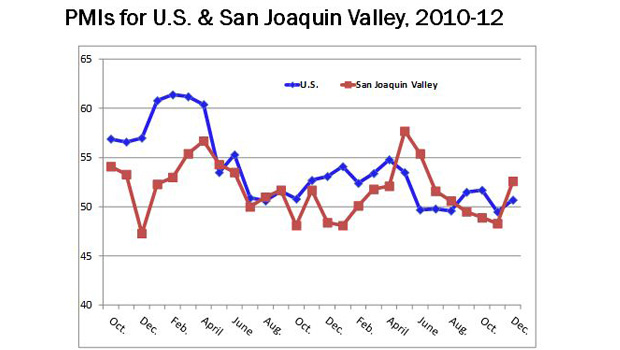After moving below growth neutral for three straight months, the San Joaquin Valley Business Conditions Index produced by Fresno State’s Craig School of Business, advanced above this threshold for December, signaling positive but slow economic and job growth for the area in the months ahead.
Highlights of the report are:
- For the first time since August, the area’s leading economic indicator climbed above growth neutral.
- Inflation gauge trends downward.
- Business confidence remains very weak.
- Hiring was positive for month.
For a second straight month, the hiring gauge moved above the growth neutral threshold, signaling the area has been adding jobs at a slow but improving pace.
The index is a leading economic indicator from a survey of individuals making company purchasing decisions in firms in the counties of Fresno, Madera, Kings and Tulare. The index is produced by Dr. Ernie Goss, a research associate with the Craig School who uses the same methodology as the national Institute for Supply Management (www.ism.ws).
The index expanded to 52.6 from 48.3 in November. An index greater than 50 indicates an expansionary economy over the course of the next three to six months.
The report found:
- The job index expanded slightly to 53.7 from November’s 50.5. “Our surveys over the past several months point to a slight uptick in new hiring in the months ahead,” said Goss.
- Both durable and non-durable goods manufacturers report modest expansions for the month.
- An improving residential construction sector is positively influencing firms with ties to this important sector. After slumping below growth neutral for three consecutive months, the national ISM index crawled to 50.7 for December.
Other survey findings:
Wholesale Prices: The prices-paid index, which tracks the cost of raw materials and supplies, declined to 59.1 from November’s 63.7. Weaker commodity prices, such as those for fuel and related and metals, linked to slower global growth are showing up in the survey, Goss said. The cheap dollar policy of the Federal Reserve has thus far failed to ignite inflation or economic growth in the nation or region. Instead, slower global growth and elevated unemployment remain an obstacle to significantly raising wholesale prices.
Business Confidence: Looking ahead six months, economic optimism, captured by the business confidence index, dipped to a feeble 37.0 from November’s 38.9. Despite improvements in residential housing, uncertainty surrounding the fiscal cliff and healthcare reform continue to lower business confidence, said Goss.
Inventories: Businesses reduced inventories to 46.1 in December, from 46.3 in November, signaling another indicator of a slowing economy, said Goss.
Trade: New export orders for December were weak, but the index rose to 46.1 from November’s reading of 37.6. At the same time, December imports contracted for the month with an index of 41.9, up from 40.9 in November.
Other components: New orders were 51.0, up from November’s 43.1; production or sales at 58.4, up from 48.0 in November; and delivery lead time at 53.8, up slightly from November’s 53.6
For more information, contact Goss at 559.278.2352.
Related links:
- Craig School of Business
- Follow Goss: Twitter.com/erniegoss or www.ernestgoss.com





